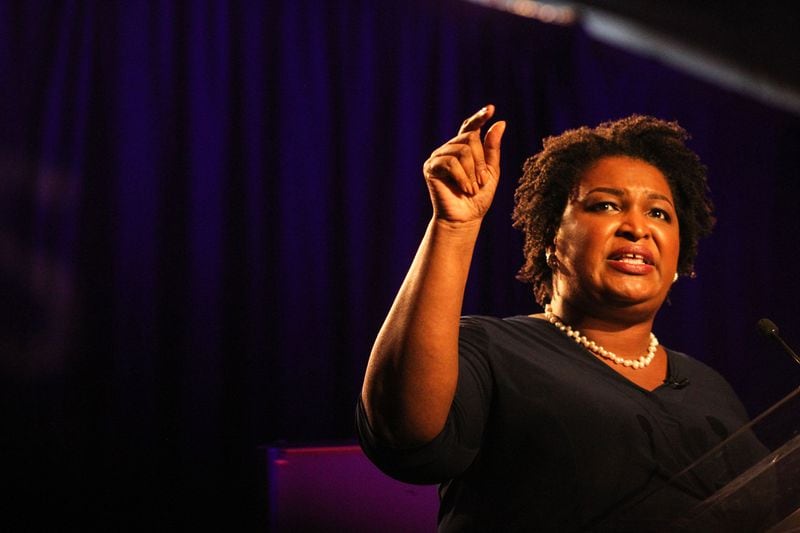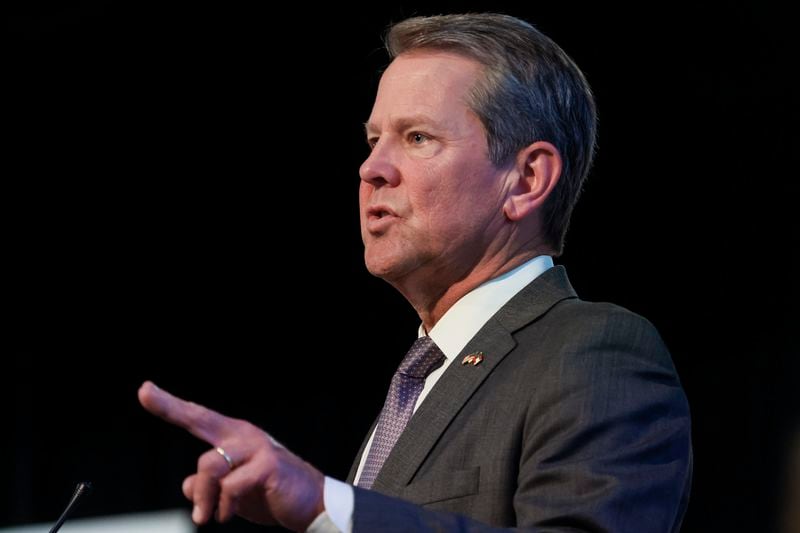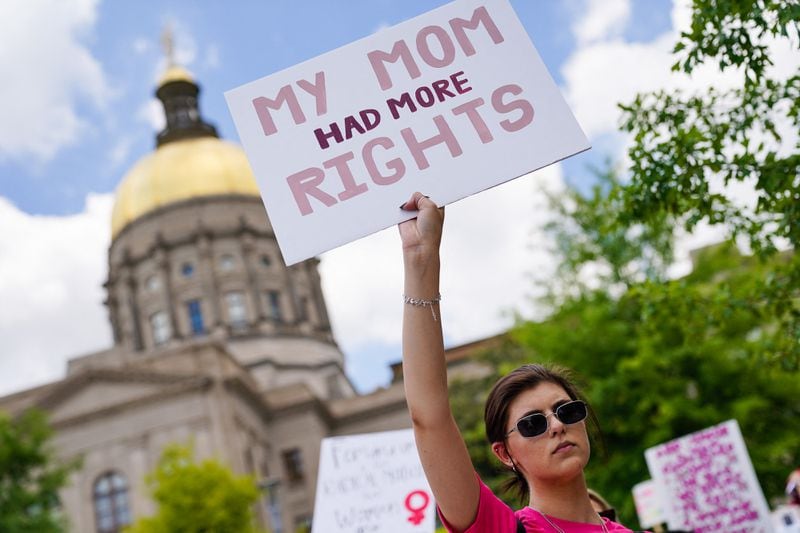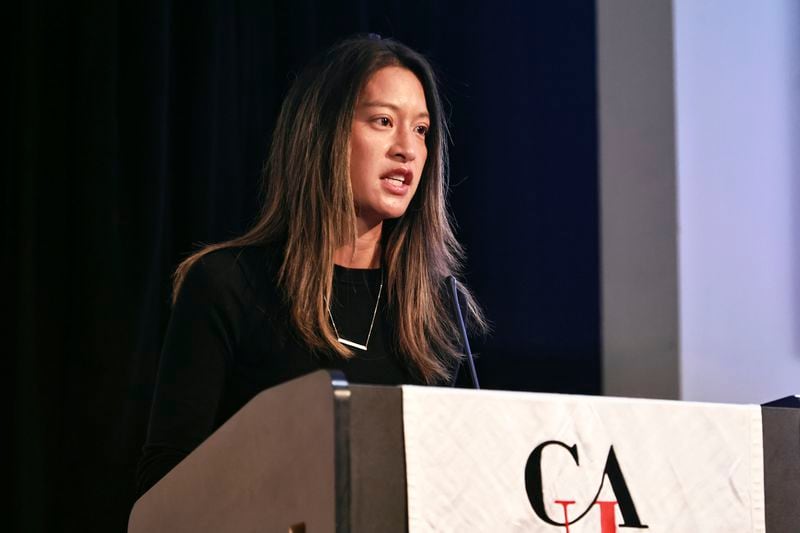U.S. Sen. Raphael Warnock and Republican Herschel Walker remain in a neck-and-neck race for the state’s wildly competitive Senate seat, according to an Atlanta Journal-Constitution/Georgia News Collaborative poll released Wednesday, while GOP Gov. Brian Kemp has a double-digit lead over Democrat Stacey Abrams.
The poll offers only a partial glimpse of the impact of reports that Walker paid for an ex-girlfriend’s abortion in 2009 despite his vows to ban the procedure. Only a handful of responses were collected after the publication of the allegations, which Walker has denied.
Still, the results underscore the challenge both candidates face to score an outright victory. The poll showed Warnock at 46% and Walker at 43%, within the margin of error of 3.1 percentage points, joining other surveys that showed both hovering below the majority-vote mark needed to avoid a runoff. Libertarian Chase Oliver drew about 4% of support, while 6% were undecided.
The race for governor was more clear-cut. Kemp led Abrams 51% to 41% in the poll, one of several that show him hovering above the majority-vote mark needed to avoid a December runoff. About 2% back Libertarian Shane Hazel, and 6% are undecided.
As with other recent surveys, the poll indicated a significant number of voters plan to split the vote between both parties. About 9% of Kemp’s voters back Warnock, and an additional 5% say they’ll vote for Oliver. About 4% are undecided. By contrast, only 1% of Abrams’ voters back Walker.
“I just feel like Raphael Warnock is a better candidate, even though he’s going to caucus with the Democrats,” said Blake Briese, a financial adviser in Fulton County who plans to back Kemp in the governor’s race. He’s concerned Walker, a former football star, isn’t “cut out for the task.”
President Joe Biden’s approval rating hovered at 38%, relatively unchanged since the last two UGA polls. Nearly half of independent voters and almost all Republicans give him poor reviews, along with about 13% of Democratic voters.
Only one-fifth of voters said the nation was headed in the right direction. But respondents had a different view of their home state, with two-thirds saying they would recommend out-of-town friends and family move to Georgia.
The poll of 1,030 likely voters was conducted Sept. 25-Oct. 4 by UGA’s School of Policy and International Affairs. It was commissioned by the Georgia News Collaborative, a consortium of more than 100 Georgia news organizations committed to strengthening local news. The Atlanta Journal-Constitution is a member of the collaborative.
The survey was weighted to reflect the overall electorate in terms of age, gender, race and education. Party identification, which is changeable and not a known quantity in Georgia, was not used as a weighting factor. The survey did interview more people who identified as Republicans (50%) than Democrats (43%), along with 7% who say they’re independent.
A solidifying trend
The results reinforced a trend of lagging support among Black voters that has dogged Abrams’ campaign. It shows that 81% of Black voters back the Democrat, 8% support Kemp and 10% are undecided. Strategists say Abrams must be at least 10 points higher among Black voters, the most reliable Democratic constituency.
“I’m concerned about her progressiveness,” said Dyann Allen-Jordan, who said she hasn’t seen much of Abrams in her majority-Black community in Athens-Clarke County. “I don’t know what she can do about it at this point.”
Warnock, the state’s first Black U.S. senator, outperformed Abrams among African American voters with 89% of the vote. That’s a 12-point gain compared with the last UGA poll in September, while Abrams’ support in the demographic grew by about 2 percentage points.
Credit: Chad Rhym
Credit: Chad Rhym
Warnock also gained a few points overall since the last UGA poll in September, thanks to slight increases in support among women and independents — each key targets of his campaign’s strategy.
Kemp’s approval rating hit 54%, fueled by broad backing from conservatives and older Georgians. It’s the latest poll that shows Kemp has largely consolidated the Republican base after humbling a Donald Trump-backed opponent in the May GOP primary.
Still, there was good news for Abrams embedded in the findings, as voters gave ringing endorsements to a quartet of issues that help define her campaign.
Most respondents — 61% — oppose the 2019 law that restricts most abortions as soon as a doctor can detect a fetal heartbeat, which is as early as six weeks. Abrams and other Democrats are counting on backlash from voters upset by the anti-abortion limits to expand the electorate.
Credit: Natrice Miller/AJC
Credit: Natrice Miller/AJC
About the same proportion of voters opposes the Kemp-backed law that allows gun owners to carry concealed weapons without a permit. Democrats say the measure will lead to more violence and undercut the state’s pro-business reputation.
Nearly 60% of voters also support using the state’s budget surplus of more than $6.5 billion to increase spending, a piece of Abrams’ platform of “generational” investments to hike teacher pay and expand Medicaid. About 31% say they’d prefer the extra funds be used to cut taxes, which Kemp has promised.
And roughly 60% of the poll’s respondents also endorse legalizing casino gambling, an idea opposed by Kemp but backed by Abrams to finance an expansion of college scholarship programs. (Voters were split on the idea of legalizing sports betting, another issue she backs.)
Abortion and the economy
The poll showed that two issues that have dominated the political discourse — abortion and the economy — continue to motivate voters ahead of the midterm election.
About half of Georgia voters said they were more likely to vote for candidates who support abortion rights, a group that included most Democrats, a plurality of independents and about 16% of Republicans.
One-third of voters say they’re more likely to vote for contenders who want to restrict access to the procedure, while about 20% say it makes no difference.
Credit: TNS
Credit: TNS
“The conservative side has gone full-on hypocrisy,” said Aaron Williams, a McDonough telecom staffer who opposes GOP attempts to limit abortions. “I can’t get behind a single conservative candidate.”
Republican candidates have sought to tie their rivals to decades-high inflation rates, and the poll showed nearly 70% view cost of living as “extremely” or “very” important in deciding their vote.
In a similar vein, 54% of voters said the high prices have had a “significant, negative” impact on their daily lives, and an additional one-third said it’s had a noticeable effect. Just 11% said it had no real impact.
“This close to Christmas, it’s going to be the economy, 100%,” said Susan Hasel, a GOP voter in Walton County. “I’ve got friends that had to get a second job just to make ends meet, and they’re in businesses that pay very well.”
Down-ticket democracy
The races for some down-ticket contests have tightened since the last poll of likely voters that UGA conducted for the AJC.
Charlie Bailey, the Democratic nominee for lieutenant governor, has whittled in half Republican Burt Jones’ 10-point lead from September. The poll showed Jones slightly ahead 44% to 39%, with 14% undecided. Bailey’s gains were fueled by a boost from women and Black voters.
Credit: Natrice Miller/AJC
Credit: Natrice Miller/AJC
In the race for attorney general, Republican incumbent Chris Carr led Democrat Jen Jordan by 47% to 39%. And Democrat Bee Nguyen trailed GOP Secretary of State Brad Raffensperger 48% to 34%. But that was an improvement for Nguyen since September, when she faced a roughly 20-point deficit.
The race between Nguyen and Raffensperger has hinged on election oversight, and the poll offered a new window into how Georgians view the inner workings of ballot access.
About two-thirds of Georgians back a provision in the 2021 election rewrite that requires a photo ID or other documentation for absentee mail-in ballots. But a slim majority — 53% — said they oppose another part of the measure that limited absentee drop boxes.
When asked whether they were satisfied “with the way democracy is working in our country,” 54% said they weren’t content.












